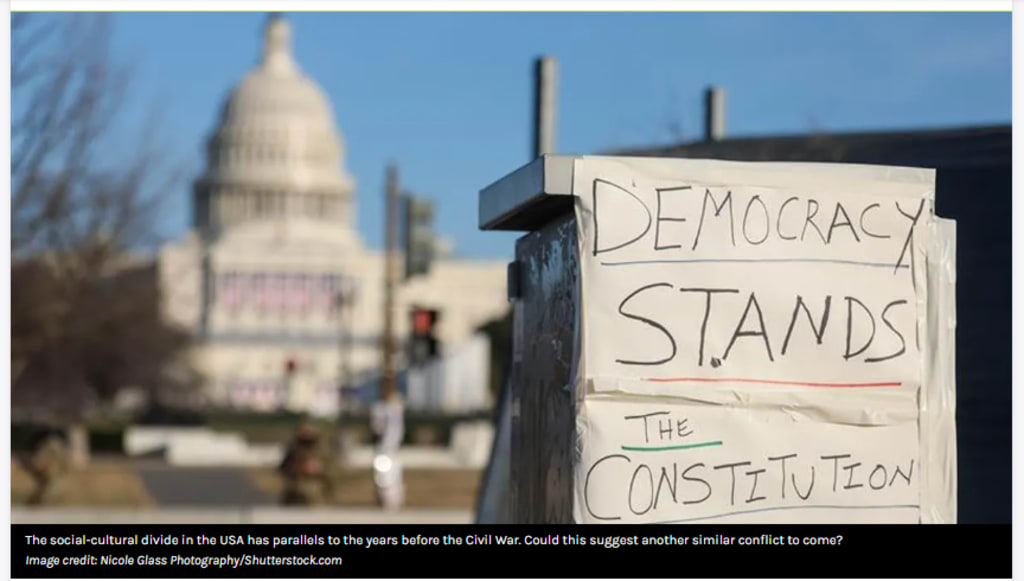Is There Going to Be Another American Civil War? There Are Some Of The Signs
Is there going to be another Civil War? Researchers are concerned that it is growing more likely even though they don't think it is likely.

Scholars have cautioned that social psychological indicators in the United States of America currently bear resemblance to those of the 1850s, the pre-Civil War era. The current sociopolitical climate may result in years of problems, social unrest, and civil turmoil that ends short of a civil war, even though another one is still unlikely.
A pivotal point in the nation's sentiment was the storming of Capitol Hill on January 6, 2021, almost two months after President Donald Trump lost his reelection. During that time, more than 2,000 Trump fans ransacked the Capitol, with many of them committing vandalism and attempting to intimidate or hurt politicians. Some demanded the murder of Mike Pence, the vice president of Donald Trump, while others charged public servants with betrayal.
Additionally, there were fatalities. Four rioters and one police officer died during the incident. Four officers who reacted to the attacks committed suicide in the months that followed.
Numerous well-known conservative commentators minimized the violence despite its severity. They described the day as "a normal tourist visit," characterizing the disturbances as "largely peaceful." Others claim that the rioters were just patriots acting in peacetime who were ambushed by police. Consequently, some, such as Republican Representative Marjorie Taylor Greene, speculated that the moment may have arrived for a "national divorce" between blue and red states.
Comparably, the usage of ostensibly hypothetical expressions like "if necessary" about the potential for civil war has increased on social media, particularly among Congressmen and local officials.
These phrases conjure up images of potential secession and create the threat of civil war, but how likely is this? "Striking similarities" – the 1850s to the present A group of US academics have evaluated the social psychological environment in the nation today and drawn comparisons with the 1850s, and they have concluded with alarming results: while still implausible, the possibility of another American Civil War is growing.
The study's goal is to "compare the zeitgeist of the divisive decade preceding the Civil War with that of the hyperpartisan era of today, demonstrating the two periods do have extensive, striking similarities," as they put it.
However, they also state that there is evidence reducing the likelihood of a violent coup d'état, secession, and/or open civil war. To put it another way, the 1850s may not be a prophesy, but we contend that comparison offers sufficient evidence that a long and harsh period of civil dysfunction—even if it falls short of a "hot" civil war—will probably be multigenerational.
The group used an inverse version of social capital theory to arrive at this conclusion. This idea from social psychology is frequently used to investigate patterns that can result in favorable social consequences, such as an increase in resources, goodwill, and group success at any scale (including across entire regions).
In this case, though, the team took a less positive tack by concentrating on negative social capital, which examines the opposite social consequences.
In this study, we compared the pre-Civil War era with the present to assess the possibility of a full-scale civil war using the social capital theory conceptual framework from social psychology. The researchers said, "The parallels are striking."
One example of how the United States today and those in the era before the Civil War are comparable is the division in particular social norms and values among Americans, the degree of which is quite similar in both cases.
The Civil War's historical foundations included, but were not restricted to, debates about the federal prerogative's authority, the benefits that some landowners received generally, the level of taxes on manufactured products, and support for or resistance to slavery. States' rights, the separation of religion and state, pro-life versus pro-abortion policies, minority rights, gun ownership, immigration, taxation, welfare support, and environmental issues are some of the current topics of contention.
There was also a generalized suspicion of politics. because the old South was more directly impacted by the main reasons for the Civil War, this mistrust was more apparent before it started. Today's circumstances are not much different, particularly in light of the Republican denial of the validity of the 2020 election. Furthermore, the Christian right feels that godless principles are attacking their way of life and existence, while others harbor misgivings about the so-called "liberal agenda" because they think it is going too far.
Additional similarities include a greater sense of affiliation with a region or identity group as opposed to a community or country; a dependence on various communication channels and a mistrust of "facts" from people outside of one's own group; a lack of institutions






Comments (1)
Amazing congratulations, can you read mine also?